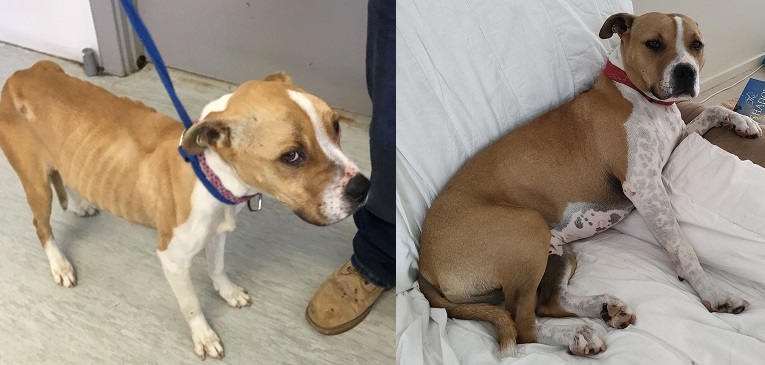
Image: Lillie when seized (left), May 2022, and right, in the home of her foster carer, Sept 2023
A 31-year-old Hope Valley man was convicted in the Adelaide Magistrates’ Court yesterday on three charges of ill-treatment of animals. The charges relate to an eight-year-old Mastiff/Boxer cross dog named Lillie and 16 cats. All the animals were found to be living in squalid and unsanitary conditions and Lillie was found in an emaciated state, weighing just 24kg and with a BCS (body condition score) of 1/9.
The male defendant and his 29-year-old female partner were jointly charged with failure to provide appropriate and adequate food and water to Lillie and failure to provide appropriate and adequate living conditions for the 16 cats. The female defendant was convicted on all charges in July this year and received a nine-month good behaviour bond.
Yesterday’s conviction of the second defendant follows a lengthy period that began on 13 August 2021, when RSPCA South Australia inspectors attended at the couple’s previous residence in Kilburn in response to a cruelty report. Over the next 10-months, RSPCA inspectors made repeated attempts to assist the couple with the care of their animals. This included provision of dog food, feeding instructions, provision of flea treatment medication and repeated offers to accept surrender of some or all of the cats that were at the property. The inspectors left cat carriers at the property to assist with surrendering the animals, but by mid-March 2022 the defendants had surrendered just five cats.
In April 2022, due to ongoing concerns for the welfare of the remaining animals and difficulties gaining access to the property, RSPCA inspectors applied to the Adelaide Magistrates Court for a warrant to enter the property. On 13 April 2022, RSPCA inspectors and SAPOL officers attended at the property and seized the emaciated dog Lillie. The inspectors provided more food for a second dog, a six-year-old Staffordshire Bull Terrier cross named Chester, who was slightly underweight. They also issued an Animal Welfare Order directing the defendants to feed all remaining animals twice a day and to provide them with fresh water, and informed the defendants that they would return in a week to check for compliance.
In RSPCA SA care, Lillie was vaccinated, wormed and put on a feeding plan. By 18 July 2022, she weighed a healthy 36.5kg. The court was told that no other medical conditions were identified that may have led to the dog’s poor condition; it was solely due to malnutrition and starvation.
Due to the continuing refusal of the defendants to surrender any more of the cats, RSPCA inspectors and SAPOL officers again attended at the property on 12 May 2022. Both defendants were present at the time. On entering the house, officers encountered an overwhelming smell of faeces and urine, with cat faeces and personal property scattered throughout every room. There was an insufficient number of litter trays for the large number of cats and the only water available to the animals was green.
Due to the squalid and unsanitary living conditions, RSPCA inspectors made the decision to remove all animals from the property. Over the next few days a total of 23 cats, together with Chester the dog and a cockatiel, were seized by RSPCA inspectors. No charges were laid in relation to the dog Chester, and he was returned to the defendants in February this year, after they had secured new housing.
The cockatiel and all except two of the cats have been rehomed. These two cats together with the dog, Lillie, had remained in protective custody but were yesterday forfeited into RSPCA SA’s care. The three animals will now be rehomed.
The defendant was facing a substantial number of police matters in addition to the animal cruelty charges, and was in custody at the time of yesterday’s sentencing. In the Adelaide Magistrate’s Court, Magistrate Karim Soetratma sentenced the defendant to three years in custody for the other matters, reduced to two years due to discounts for time served and time on home detention bail.
Given the amount of time in custody for the other offending and that the cruelty offences were heavily impacted by his drug addiction, he did not get an additional sentence for the animal ill-treatment offending. Both defendants are prohibited from owning any animals except one dog and one cat that remain in their care.
RSPCA SA Chief Inspector Andrew Baker said the case highlighted the importance of desexing pets to prevent unwanted litters, and taking timely action before things get out of hand.
“This couple was offered assistance on multiple occasions but instead opted to keep living with these animals in a house that they had allowed to become dangerously squalid and unhygienic,” Inspector Baker said.
“We urge people to recognise their limits and only have the number of animals that they have the resources to maintain in good health, and to microchip, register and desex their animals, as required by law under the Dog and Cat Management Act.”
Under SA’s Animal Welfare Act, the maximum penalty for animal cruelty is $20,000 or two years’ imprisonment. For an aggravated cruelty offence, the maximum penalty is $50,000 or four years’ imprisonment.
RSPCA South Australia is the state’s only animal welfare charity with inspectors empowered to prosecute animal cruelty under SA’s Animal Welfare Act.
Members of the public who witness animal cruelty or neglect are urged to immediately call RSPCA’s 24-hour cruelty report hotline on 1300 477 722.







